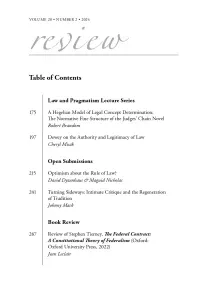Review 29.2 & 29.3: Our More Than Human Constitutions
The Centre is delighted to announce that our new special double issue of the Review of Constitutional Studies is now fully available to download via both Heinonline and EBSCO (Hein links provided below).
The special issue, which is titled "Our More Than Human Constitutions," was guest edited by Professors Jessica Eisen (University of Alberta) and Lindsay Borrows (Queen's University). It comprises contributions from scholars in an array of academic fields -- including Indigenous law, environmental law, and animal law -- on the ways in which our legal orders, Indigenous and state, approach the regulation of the more-than-human.
While the issue is currently only available for Hein and EBSCO subscribers, it will be available for free on our website one year after its initial publication.
***
SPECIAL DOUBLE ISSUE: OUR MORE THAN HUMAN CONSTITUTIONS
***
Issue 1: 29.2
Introduction: Our More-than-Human Constitutions
Borrows, Lindsay; Eisen, Jessica
Learning Anishinaabe Law from the Earth
Borrows, John
Transforming Constitutionalism from a More-than-Human Perspective
Nedelsky, Jennifer
Nehiyaw Pimatisiwin and Regenerative Constitutionalism
Lindberg, Darcy
Dark Innovations, Climate Justice, and the Canadian Charter
Majekolagbe, Adebayo
"A Hot Day in Iqaluit"? Environmental Rights in Canada's Constitutional Cul-de-Sac
Wood, Stepan
***
Issue 2: 29.3
Making Space for Indigenous Legal Relationship with Plants in Aboriginal Law
Spalding, Pamela
Learning Law from Plants
Borrows, Lindsay
Re-Learning Reciprocity: Settler Treaty Obligations and the More-than-Human World
Askew, Hannah
Learning about Treaties with the Animal People: Lessons for Treaty 8
Gimenez, Rebeca Macias
Animals, Colonialism, and the Rule of Law
Deckha, Maneesha
The Unwritten Constitution and the More-than-Human World
Eisen, Jessica
